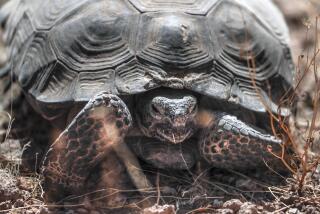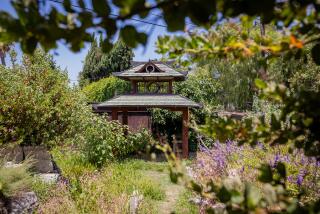Casa de Tortuga Is Just Simply Crawling With Tortoises: 450 of Them
- Share via
How do you disconnect a 200-pound Galapagos tortoise from an electrical cord that he has stripped and clamped his mouth around?
As quickly as possible, according to the animal keepers at Casa de Tortuga in Fountain Valley. First you unplug the cord from the wall, then you try to distract the animal by tickling its legs, tapping on its shell and yelling.
Darwin, the tortoise in question, attacked the cord inside his “turtle-house” one recent morning because he was in a snit over not being given strawberries quickly enough. These days Darwin is frequently in a snit, according to his caretakers, but they aren’t always sure why.
Those humans who seek tours of Casa de Tortuga aren’t in danger from Darwin’s temper, though. The rare Ecuadorean tortoise isn’t aggressive toward people. In addition, a short wall separates Darwin’s yard from footpaths and from the habitats of over 450 turtles and tortoises that live at collector Walter Allen’s house.
Allen’s Casa de Tortuga is the largest private collection of turtles and tortoises in Orange County, with over 100 different species represented. It’s the only local private collection open to the public. In addition to the real turtles, the house features more than 20,000 bits of turtle memorabilia--mobiles, plaques, fountains, drawings, planters, ashtrays, statues.
Allen, 60, began collecting turtles and tortoises as a hobby in 1967. The hobby quickly got out of hand. When his collection grew to 100 animals a decade ago, Allen moved from Santa Monica to his present, larger home. Today he employs one full-time and four part-time turtle tenders.
A spare, wiry man with a thin beard and a slightly rounded back, Allen says turtles and tortoises are “just something I love. I love all wild creatures.” Many species are threatened, he said, and “somebody has to do something” to help save them.
Through Casa de Tortuga, Allen seeks to keep specimens of threatened turtle species alive, comfortable and happy. For instance, Darwin (whom Allen acquired 17 years ago, when the tortoise weighed only 4 1/2 ounces), like several other exotic tortoises in the collection, has an insulated, heated house into which to retire at night and when the weather is cool. What’s more, Darwin will soon have new, more luxurious quarters. A lot neighboring Allen’s house is being turned into a big tortoise yard with new tortoise houses. “Those buildings are better than most people’s houses,” said Martha Young-Wheeler, the ebullient full-time turtle house manager Allen hired nine years ago.
Perhaps, Young-Wheeler hypothesizes, Darwin’s mood will improve when he has more room in which to exercise and get to know Daphne, a 300-pound female Galapagos on breeding loan from the Honolulu Zoo.
A large new pond is also under construction, so the 214 red-eared and yellow-bellied sliders, Japanese coin turtles, map turtles, mud turtles and diamondback terrapins in the collection will have a better environment than in their present pond.
In addition to running Casa de Tortuga, Allen is helping finance and produce a documentary about turtles around the world. The film is being directed by Peter Pritchard, a well-known turtle expert who wrote the “Encyclopedia of Turtles,” which Allen calls “the bible of the turtle world.” For the film, Allen has traveled with Pritchard to South America, Central America, Africa, the Seychelles and all over the United States. Work on the film began four years ago and should be completed by 1990, according to Allen.
Small donations from visitors (no admission is charged) and from the California Turtle and Tortoise Club pay a fraction of Casa de Tortuga’s expenses, but Allen foots most of the bills himself. It costs between $40,000 and $50,000 a year to pay staff salaries, buy turtle food, pay veterinary bills and keep the turtle grounds in shape, according to Young-Wheeler.
While most of the house’s exotic turtles were purchased, many U.S. turtles were donated. Most of the donated animals came from people who were unable to take proper care of them. Some of these animals are available to good homes through Casa de Tortuga’s adoption service, which has been approved by the state Department of Fish and Game.
Allen has been retired for 10 years from a family oil business. The business was sold, and income from the sale supports him, his wife and their reptiles, he said.
Talking to people about turtles and traveling the world to observe and help preserve wild turtle populations keeps him lively, Allen said. “I’m not one of those guys who could sit in a rocking chair and watch soap operas” in retirement. “I’d go stale.”
CASA DE TORTUGA AT A GLANCE
Where: A private residence in Fountain Valley. Directions given only when tour appointment is made. Call (714) 962-0612 between 8 a.m. and 3 p.m.
What: A collection of more than 450 turtles and tortoises from around the world.
Highlights: Water turtle ponds, tortoise yards featuring rare South American tortoises and California desert tortoises, a large collection of ceramics and other turtle memorabilia.
Hours: Tours begin at 10 a.m. each day and last 30 to 45 minutes.
Services: Free tours of the facility, information about turtle and tortoise care, an adoption service for those seeking pets. Free turtle care guidelines can be obtained by calling, or by writing to P.O. Box 8952, Fountain Valley, Calif. 92728.
Special event: On April 24, from 10 a.m. to 4 p.m., Casa de Tortuga staff will participate in the 12th annual Turtle and Tortoise Show, sponsored by the California Turtle and Tortoise Club, at Martin Recreation Center in La Palma Park, Anaheim. The show will feature animals from private reptile collections, educational displays and adoption information. For more information, call (714) 527-2326, (213) 693-6507 or (213) 408-2583.






